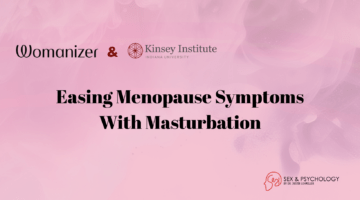Sex Is Good For Our Mental Health
August 14, 2017 by Justin Lehmiller
Sex stands to benefit us in many ways. For example, research has found that being sexually active appears to be good for our physical health—not only does having sex burn calories, but frequent orgasms have been linked to better immune function and longer life expectancies. In addition, sex has been linked to enhanced cognitive functioning (including better memory), which suggests the provocative possibility that having sex just might make us smarter. As if that weren’t enough, a new study published in the journal Emotion reveals that sex also seems to be good for our mental health and well-being.
In this study, 152 college students (aged 24 on average) participated in a daily diary study for three weeks. Each day, participants reported on their sexual activities and answered a few questions about their mental well-being, including how much meaning they felt in life and their current levels of positive (e.g., happy and excited) and negative mood states (e.g., anxious and sad). The researchers then looked at how sexual activity on one day predicted mental well-being the next day.
What they found was that on days participants had sex, they reported gains in mental well-being the following day. Specifically, they reported more meaning in life, more positive mood states, and fewer negative mood states.
Beyond just having sex, the quality of the sex people had mattered, too. Specifically, the more pleasurable people reported their sexual encounter as being, the better their mood the following day. Quality of sex was unrelated to meaning in life, though.
The researchers also tested to see whether mental well-being predicted sexual activity in order to determine whether there was any evidence of reverse causation—that is, does positive well-being on one day increase the odds of having sex on subsequent days? Interestingly, well-being was unrelated to sexual activity on later days, suggesting that the flow is from sex to well-being, rather than the other way around.
They also found that the increase in well-being was temporary, lasting only one day. In other words, sex didn’t predict well-being on days 2 or 3. However, they did find that greater sexual intimacy was linked to enhanced positive mood two days later, which suggests that some types of sexual activity might produce longer-lasting effects than others.
This pattern of results held for both men and women; however, the link between sex and enhanced well-being was stronger for people who reported being closer to their partners.
This research is limited due to the fact that it focused on college students who were predominately heterosexual. As such, it is important to replicate these findings in an older and more diverse sample. In addition, the fact that well-being did not predict future sex is intriguing because, intuitively, you might expect that people in good moods would be more likely to pursue sex. This is another reason why it would be worthwhile to replicate these findings before drawing too many conclusions and generalizing too broadly.
Limitations aside, however, this study adds to a growing body of research suggesting that sex is good for us in multiple ways, including both our physical and mental health.
Want to learn more about Sex and Psychology ? Click here for previous articles or follow the blog on Facebook (facebook.com/psychologyofsex), Twitter (@JustinLehmiller), or Reddit (reddit.com/r/psychologyofsex) to receive updates.
To learn more about this research, see: Kashdan, T. B., Goodman, F. R., Stiksma, M., Milius, C. R., & McKnight, P. E. (2017). Sexuality Leads to Boosts in Mood and Meaning in Life With No Evidence for the Reverse Direction: A Daily Diary Investigation. Emotion.
Image Source: 123RF/Katarzyna Białasiewicz
You Might Also Like:

Dr. Justin Lehmiller
Founder & Owner of Sex and PsychologyDr. Justin Lehmiller is a social psychologist and Research Fellow at The Kinsey Institute. He runs the Sex and Psychology blog and podcast and is author of the popular book Tell Me What You Want. Dr. Lehmiller is an award-winning educator, and a prolific researcher who has published more than 50 academic works.
Read full bio >


